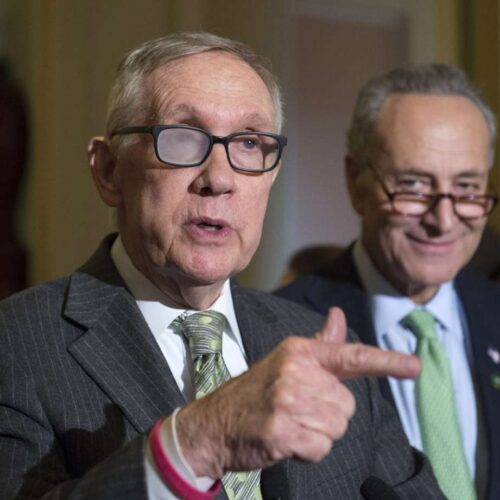Introduction
It’s not what they teach in civics class, but the best way to snag a leadership position in Congress is by giving generously to one’s colleagues. By that measure, U.S. Sen. Charles Schumer, D-N.Y., is well-positioned to be the next Senate Minority Leader.
Sen. Harry Reid, the top Democratic leader in the Congress’ upper chamber, said today he will not run for re-election in 2016, prompting speculation as to his potential successor. Two senators — Schumer and Dick Durbin of Illinois — have risen to the top of the list.
Schumer’s leadership political action committee, known as “IMPACT,” doled out almost $1.5 million from 2010 through 2014, according to data gleaned from the Federal Election Commission by the Center for Public Integrity. The total includes at least $720,000 donated to Senate Democrats.
Durbin’s Prairie PAC gave away $1.3 million from 2010 through 2014, with at least $675,000 going to Senate Democrats.
But the real difference is in party committee giving. During the same time period, Schumer, via his campaign committee and leadership PAC, gave $5.1 million to the Democratic Senatorial Campaign Committee, more than twice the $2.2 million that Durbin raised with, and contributed to the committee.
Leadership PACs are political committees used by members of Congress to win friends and influence people. They have in the past been criticized as legal slush funds, used for all manner of expenses.
“It’s just unimaginable that anyone would even have a hope of running for Senate leader without having been an active giver,” said Meredith McGehee, policy director at the Campaign Legal Center. “You wouldn’t even have a chance in hell of winning.”
Schumer, the third-ranking Democrat in the Senate, gained visibility and allies when he was chairman of the DSCC from 2005 to 2009. He helped Democrats take control of the Senate in 2006. Despite his role as favorite — Reid is backing him — he is actually outranked by Durbin, who is No. 2.
The New York senator’s ascension would be good news for Wall Street — his top three contributors from 1989 through 2014 were the employees and political action committees of Goldman Sachs ($543,000), Citigroup Inc. ($484,000) and JPMorgan Chase & Co. ($365,000) according to the Center for Responsive Politics. The securities and investment industries are by far his top donors having given more than $10.4 million over that time frame.
Schumer serves on the Senate Finance Committee as well as the Banking, Housing and Urban Affairs Committee.
As for Reid, his retirement will be a blow to the gambling industry, which has been a staunch supporter of the 75-year-old former boxer over his tenure. Three of his top five donors are in the gambling business, including his top benefactor, MGM Resorts International, which has given more than $375,000, according to CRP.
Durbin, meanwhile, while also a friend of Wall Street, is a favorite of lawyers and law firms, according to CRP data. He’s raised nearly $5 million from members of the profession and their political action committees since 1989. The securities and investments industry came in at No. 2, with more than $1.4 million in donations.
Reid has been recovering from injuries suffered in an accident that occurred while he was exercising. The bruised Las Vegas senator said in a lavishly produced video released Friday that his injuries had nothing to do with his decision to step down.
“The decision I have made has absolutely nothing to do with my injury, has nothing to do with my being minority leader, and it certainly has nothing to do with my ability to be re-elected,” he said.
Reid has led the Democrats in the Senate since 2005. The party lost control in the 2014 election, relegating Reid to the role of minority leader. Since then he has been a vocal critic of the billionaire donors to Republican causes, Charles and David Koch, a thorn in the side of Republicans in both the House and Senate, and a staunch supporter of President Obama’s policies.
Carrie Levine contributed to this report.
Read more in Money and Democracy
Money and Democracy
Rapper-backed group illustrates blind spot in political transparency
Will limited liability companies be the next frontier of ‘dark money’?
Money and Democracy
U.S. Chamber doubling down on political juggernaut
Nation’s largest lobby will play ‘long-haul game’ to overcome bleak policy prospects


Join the conversation
Show Comments